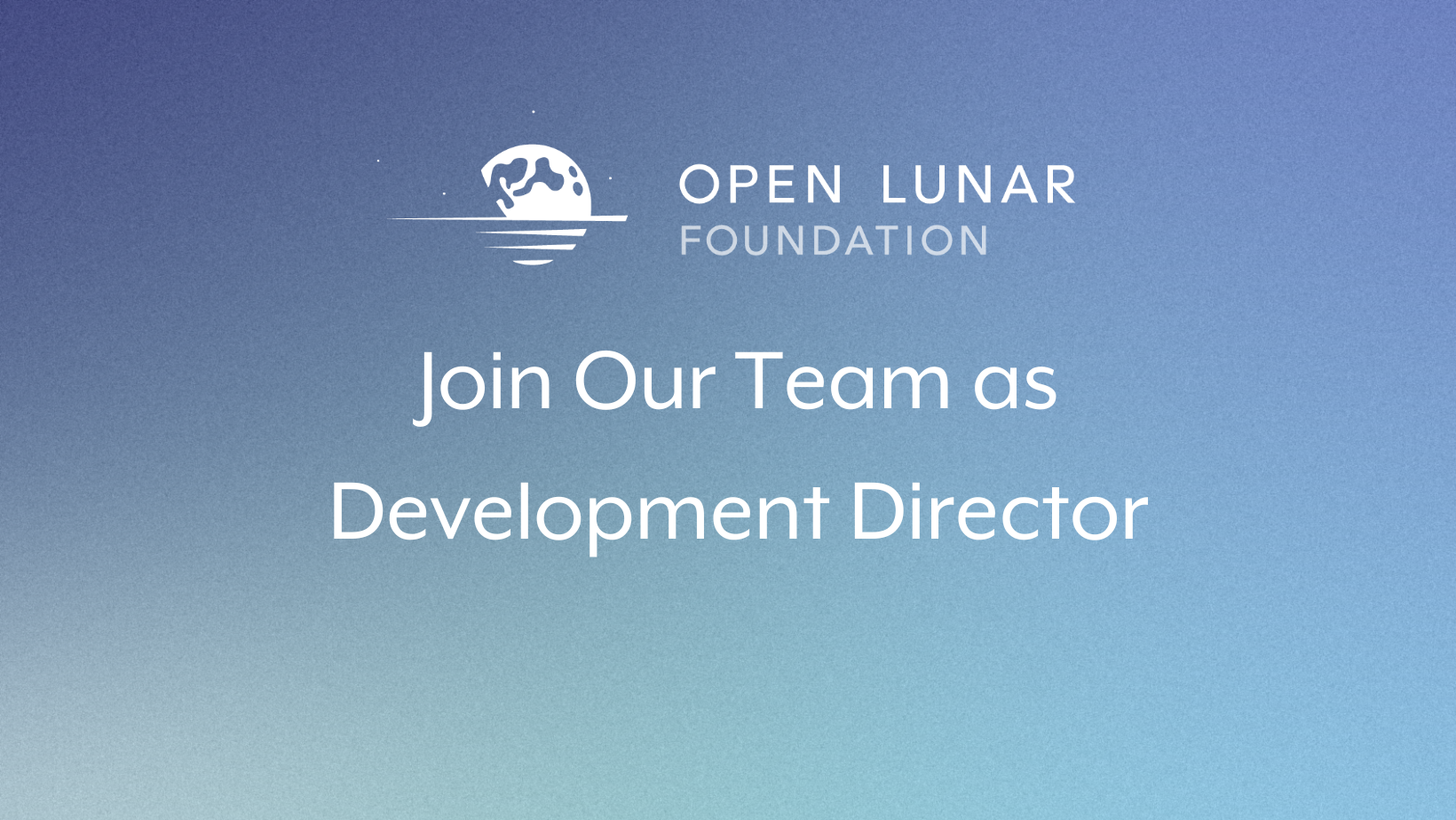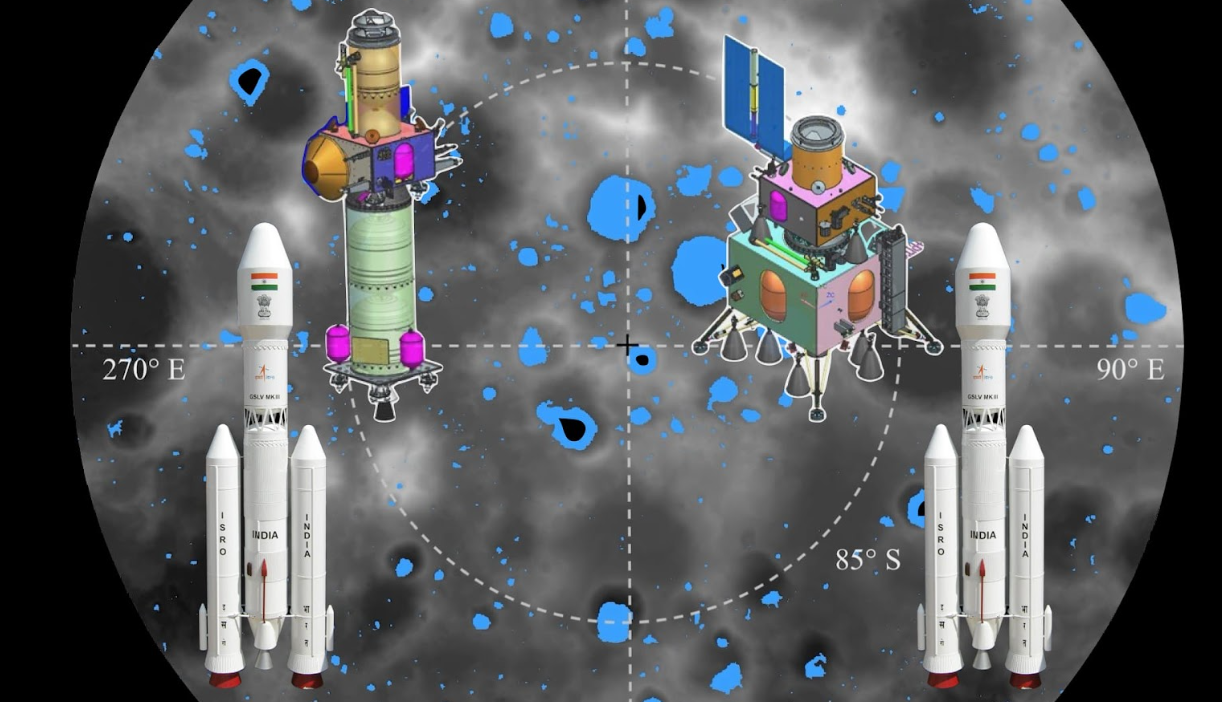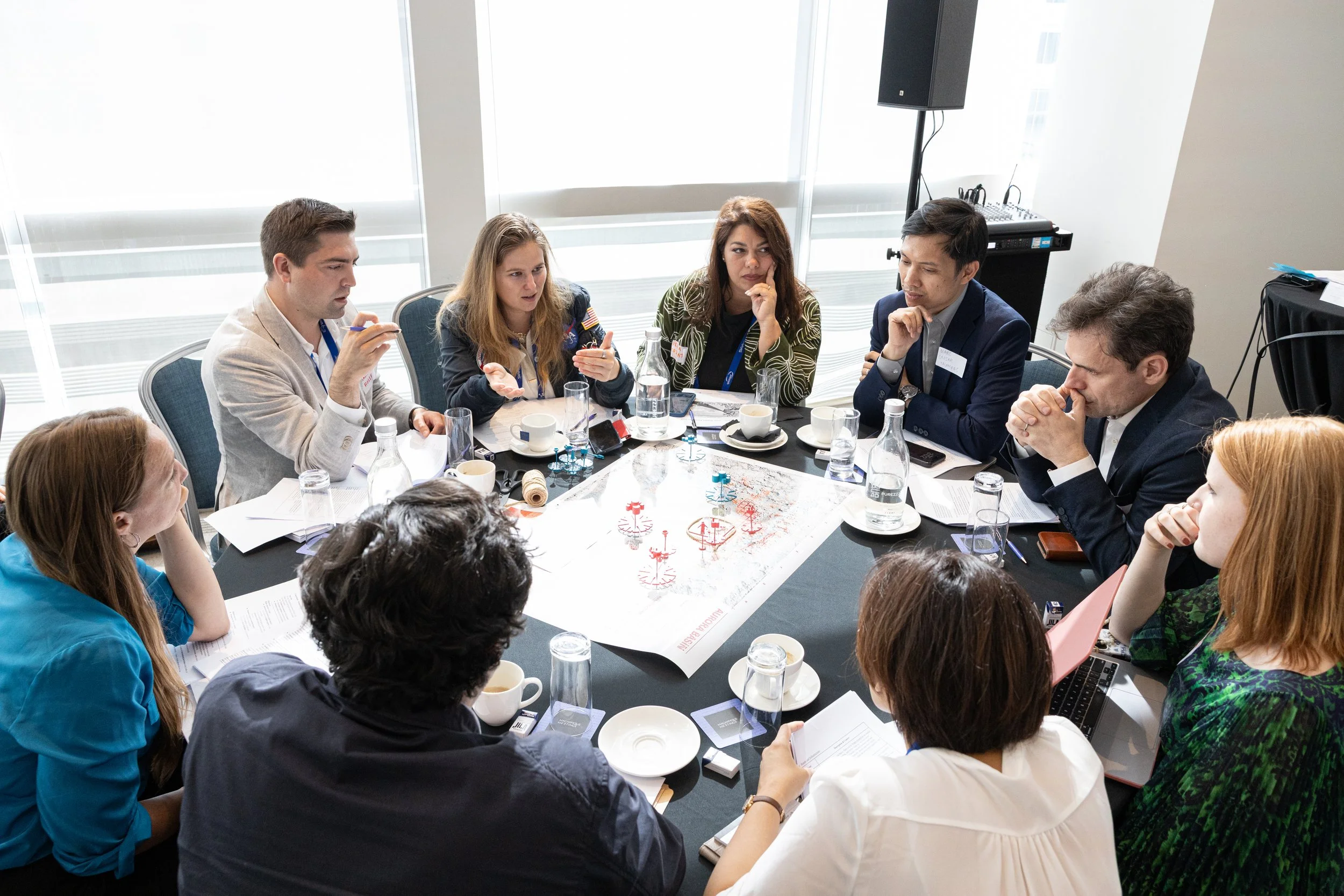
Humanity is returning to the Moon. How we do it matters.
We work to ensure a peaceful and cooperative presence on the Moon, through collaborative technology, policy and infrastructure.
Open Lunar builds infrastructure,
leveraging expertise in governance, innovation, and technology.
We are entrepreneurs, astronauts, scientists, lawyers, engineers, and more collaborating to build an open lunar future. We have a global community led by a core staff enabling success.
We commission research on key challenges identified by the sector. We address a range of issues such as deconfliction, dust, data sharing, standards, and then build informed solutions.
We incubate infrastructure projects for lunar actors to collaborate and steward the Moon: technical standards, policies, legal frameworks, digital tools, services and hardware.

apply to our development director position Join our team to influence the future of the Moon
Lead fundraising to fuel cooperative lunar governance and infrastructure — shape us humanity’s return to the Moon.
an Open Lunar Flagship Project As lunar operations grow in frequency and complexity, so does the need for credible, accessible data. The Lunar Ledger offers a neutral, open-access database where missions can be registered and activities tracked, helping reduce risks, avoid site conflicts, and build trust across the sector.
Incubated under Open Lunar as the Lunar Registry, the Lunar Ledger is the result of deep collaboration with more than 300 stakeholders from across the lunar sector.

The Lunar Ledger: Empowering open data-sharing for lunar missions
OUR EXPERTISEWe are an independent
convener for projects and partnerships
enabling lunar stewardship.
20+
infrastructure projects
30+
research fellowships
50+
expert advisors
70+
open research
papers
1,500+
community members
novel Research Result Explore our newly released research
See how stewardship, a coordinated operational framework, and lunar scenarios fuse to chart a sustainable path for the Moon through Lunar Areas Field Guide.
THE OPEN LUNAR BLOGOpen research progresses the sector
Read more about our recent Development Director posting and what our team is looking for.
Here’s a comprehensive, curated, and contextualized linked list of lunar technology and science developments across 2025, organized by country or region. There is also a section on progressive cooperative & collaborative international efforts—because these are the gems we need more of—as well as a section discussing shortcomings in the same. If someone asks you what’s happening at the Moon, say all of this is.
A volcano of new results which have improved our understanding of our cosmic companion.
A new approach to lunar timekeeping—built from affordable commercial hardware, redundant clock networks, and shared open infrastructure.
Every year, we work to collate our recent insights and share it publicly through our fellowship research showcase events. This event celebrates the launch of the Lunar Areas Field Guide by Christine Tiballi.
NASA’s Lunar Reconnaissance Orbiter has long been the foundation of lunar exploration, but its aging systems leave a growing data gap for future missions. Despite scientific calls for a successor, NASA hasn’t approved one, leaving newer international and commercial orbiters to fill the void. There is an urge for coordinated global efforts to share data and create a network of orbiters to better support upcoming Moon missions.
Open Lunar joined the global space community in Sydney for the 76th International Astronautical Congress (IAC), sharing new milestones in lunar cooperation. From launching the Lunar Ledger to hosting a high-intensity governance simulation and advancing environmental monitoring with Honeybee Robotics, we helped shape conversations on how humanity can govern the Moon responsibly and collaboratively.
The Open Lunar Foundation has launched the Lunar Ledger, the world’s first open-access database of lunar missions and surface activities. Announced at the International Astronautical Congress in Sydney, the launch marked the signing of new cooperation agreements with founding commercial partners Firefly Aerospace, ispace, and Astrolab. Together, these early adopters have committed to sharing mission data through the Ledger — a major step toward transparency, coordination, and responsible lunar operations as activity on and around the Moon accelerates.
India’s upcoming Chandrayaan-4 mission aims to return lunar samples from the Moon’s south pole, positioning the country to join the global community of sample-return missions led recently by China’s Chang’e program. The article discusses how scientists could actively engage in studying Chang’e samples now, both to gain scientific benefits and to prepare for international collaboration and potential sample exchanges once Chandrayaan-4 succeeds.
A review of upcoming and past lunar missions of this decade shows a wide gap between notions of technological progress versus achieved reality.
Our fellowships are a key part of Open Lunar’s innovation process. Through rigorous evaluation in accordance with our impact criteria, we have identified three key focus areas for our fellows in 2026. Fellowships will advance research in these key areas, impacting where Open Lunar continues to invest and building momentum to support further development of project areas.
Every year, we work to collate our recent insights and share it publicly through our fellowship research showcase events. This event celebrates the launch of the Lunar Positioning, Navigation, and Timing (PNT) research by Dr. Peng Hu.
Discover how our research fellowship program is helping advance key topics that are fundamental to realizing a peaceful presence on the Moon.
The Moon has yielded profound scientific discoveries through decades of international missions—from confirming its fiery origins to revealing water and recent volcanic activity. A new guide from the Lunar Policy Platform explores how we can preserve lunar science as a global commons through innovative governance approaches.
The Lunar Ledger is paving the way for transparency and coordination in lunar activity. With our closed beta now underway, we’re sharing an inside look at the platform’s core features and how they lay the groundwork for a more collaborative future on the Moon.
JAXA's SLIM achieved the most precise lunar landing ever in 2024 using shared data from ISRO's Chandrayaan 2 orbiter, demonstrating the power of international collaboration in lunar exploration. However, current lunar mission information sharing remains ad hoc and inefficient, prompting the Lunar Policy Platform to launch the "Lunar Information Sharing 101" initiative to establish better coordination frameworks.
After three years of rigorous research, community consultation, and technical development, the Open Lunar Foundation is proud to announce the official launch and rebranding of our flagship registry project as the Lunar Ledger: Global Lunar Database of Objects and Activities.
We’ve explored frameworks for lunar adaptive environmental protocols, harmonization areas, and a management scheme supported by digital twins and risk modeling in Parts I & II. Part III explores a particularly promising approach to adaptive governance, leveraging Public Purpose Trusts (PPTs) as a foundational element of a proposed Lunar Consortium, providing both legal accountability and commitment to collective vision.
ispace's recent unsuccessful lunar landing attempt reminds us that while lunar exploration is becoming more diverse and global, the Moon itself remains unforgivingly difficult—which is why now more than ever, collaboration and information sharing are paramount.
2025 is almost halfway through, and we’ve already seen a raft of lunar exploration achievements and developments from organizations worldwide. Here’s a curated list of them all, each linked for understanding the context of its development. If someone asks you what’s happening at the Moon, say all of this is. 🌗
Mr. Jardine attended the UNCOPUOS Legal Sub Committee in Vienna in May 2025 and shares his key takeaways.
Open Lunar Foundation is excited to welcome Christine Tiballi to the team. Read more about Christine’s background and position below.
Open Lunar Foundation is building the Lunar Registry, a community platform to share information about Moon missions as well as privately coordinate orbital traffic to reduce collision risks and build trust between competing entities.
Part II of this series turns theory into practice, introducing a new mechanism for designating activity areas on the Moon. Here, we lay out an operational strategy and practical guidelines aimed at fostering transparency, cooperation, and purposeful communication.
Open Lunar’s Director of Industry Integration recently had the opportunity to speak at MIT about lunar governance. Read an overview and reflections here.
Open Lunar Foundation is excited to welcome Rae Smith-Cohn to the core team. Read more about Rae’s background and position below.
This work is completed by Peng Hu, an Open Lunar Fellow, undertaking research on Lunar Position, Navigation, and Timing (PNT). This first blog post summarizes current proposed architectures to support lunar position, navigation, and timing services. Interoperability and open standards are noted as key considerations in building a resilient, configurable, and secure integrated PNT solution.
Fellow Christine Tiballi establishes a framework to support resource management on the lunar surface. Taking lessons from terrestrial governance, she proposes a lunar equivalent to support open access, adaptable environmental protocols, and unique local governance arrangements.
Firefly’s Blue Ghost lander proved that Earth-based GNSS can support lunar navigation, a key step toward LunaNet, an interoperable Moon-based network. Open Lunar’s Dr. Peng Hu is enhancing LunaNet’s resilience to ensure secure, reliable connectivity for future missions.
Open Lunar Foundation is excited to welcome Mehak Sarang to the core team. Read more about Mehak’s background and position below.

We envision a long term human presence on the Moon demonstrating collaborative governance and stewardship. Shared infrastructure is the path to that future.

The precedents we set on the Moon can inspire solutions to challenges on Earth.
Official main-stage TED Talk from one of the founders and board members of Open Lunar, Jessy Kate Schingler.

“It is inevitable that we become an interplanetary species. Let’s work together to do this right.”
ISS Commander Chris Hadfield, Open Lunar Board Chair

































